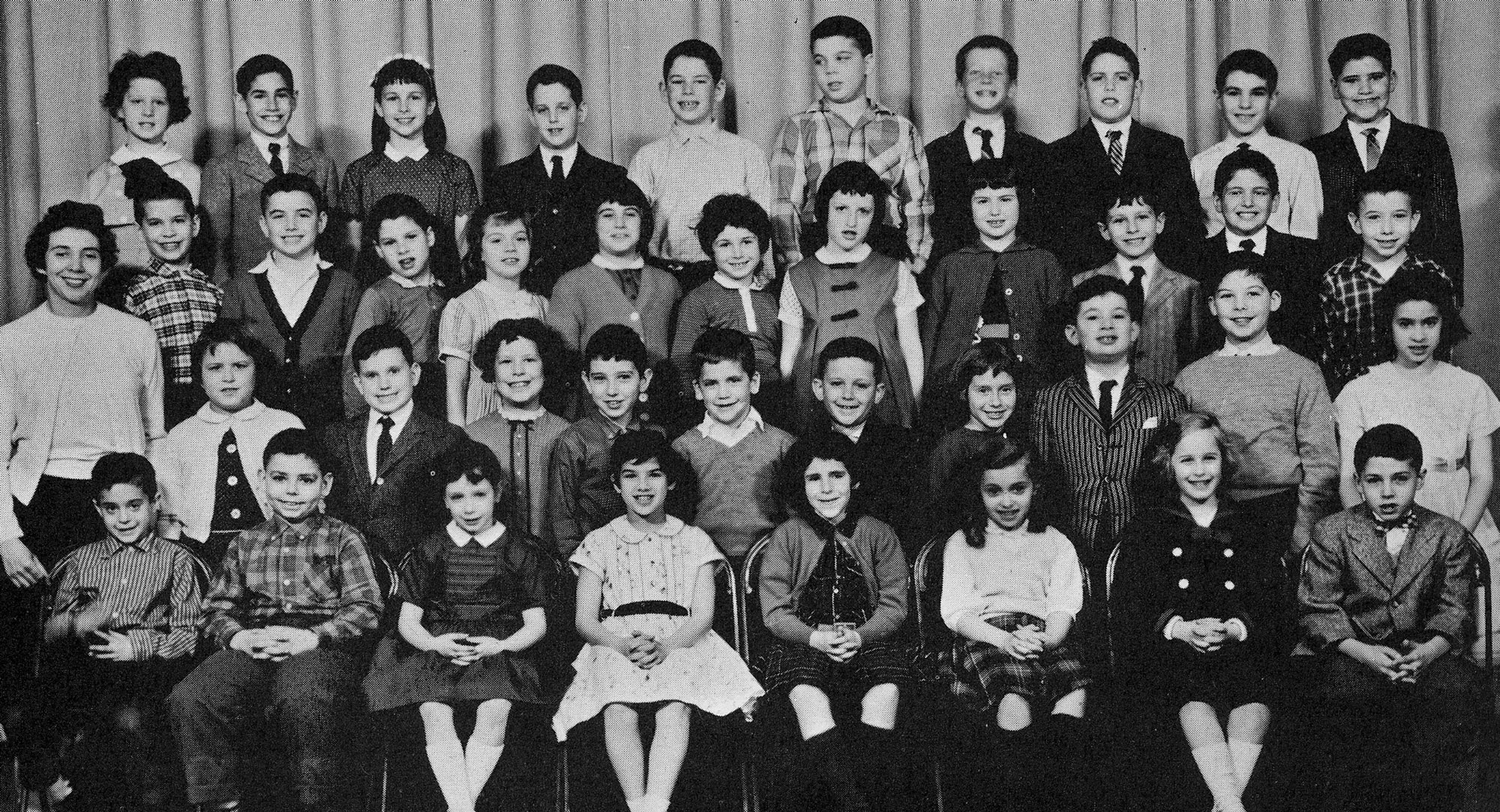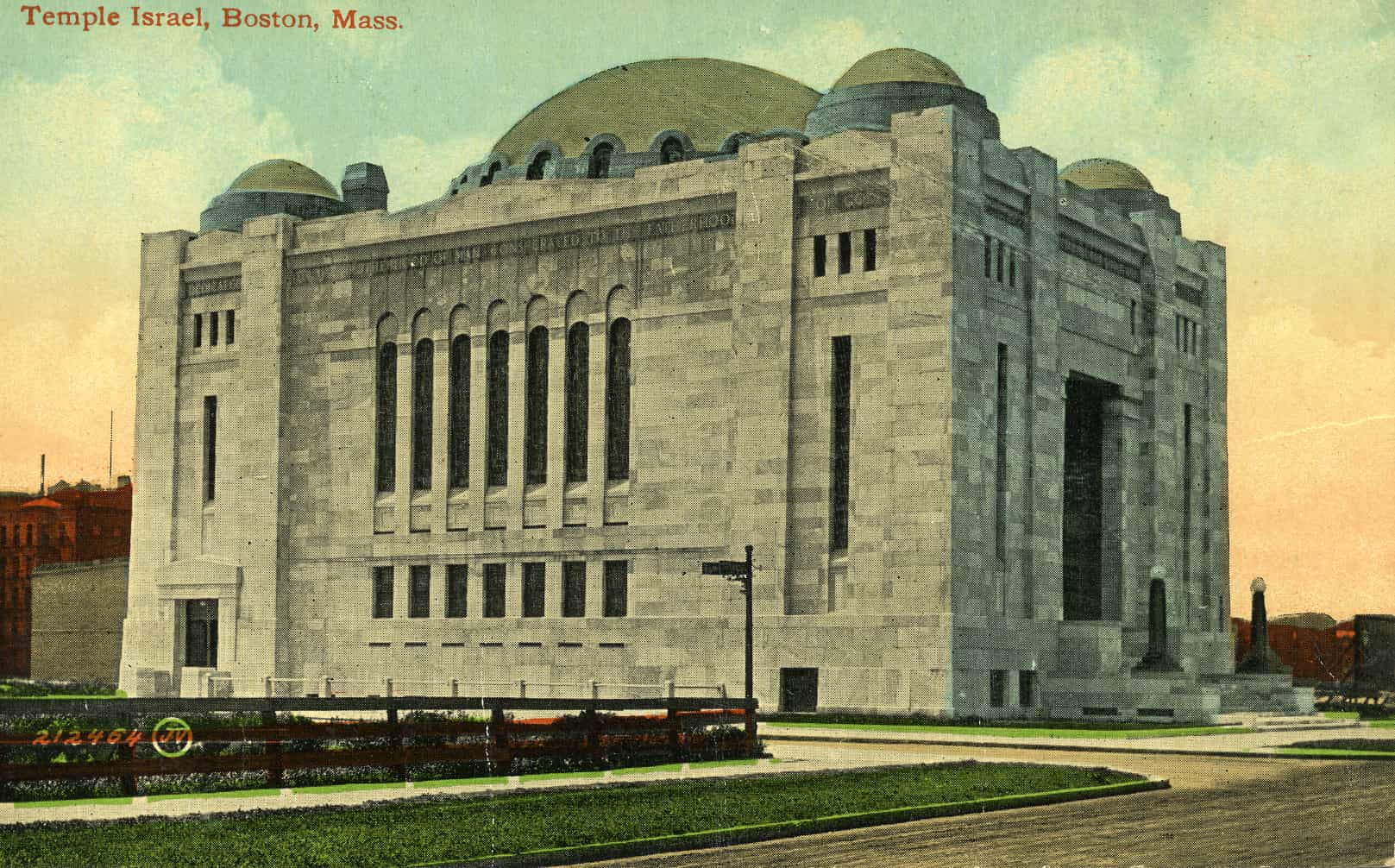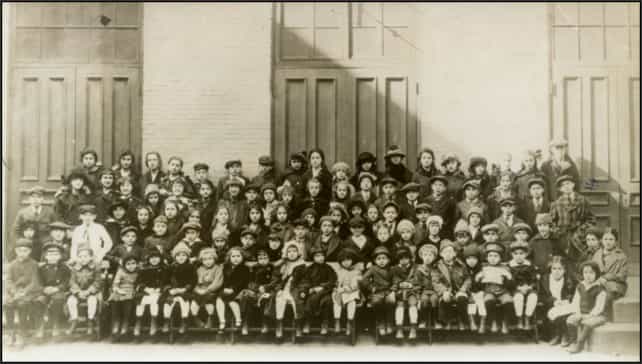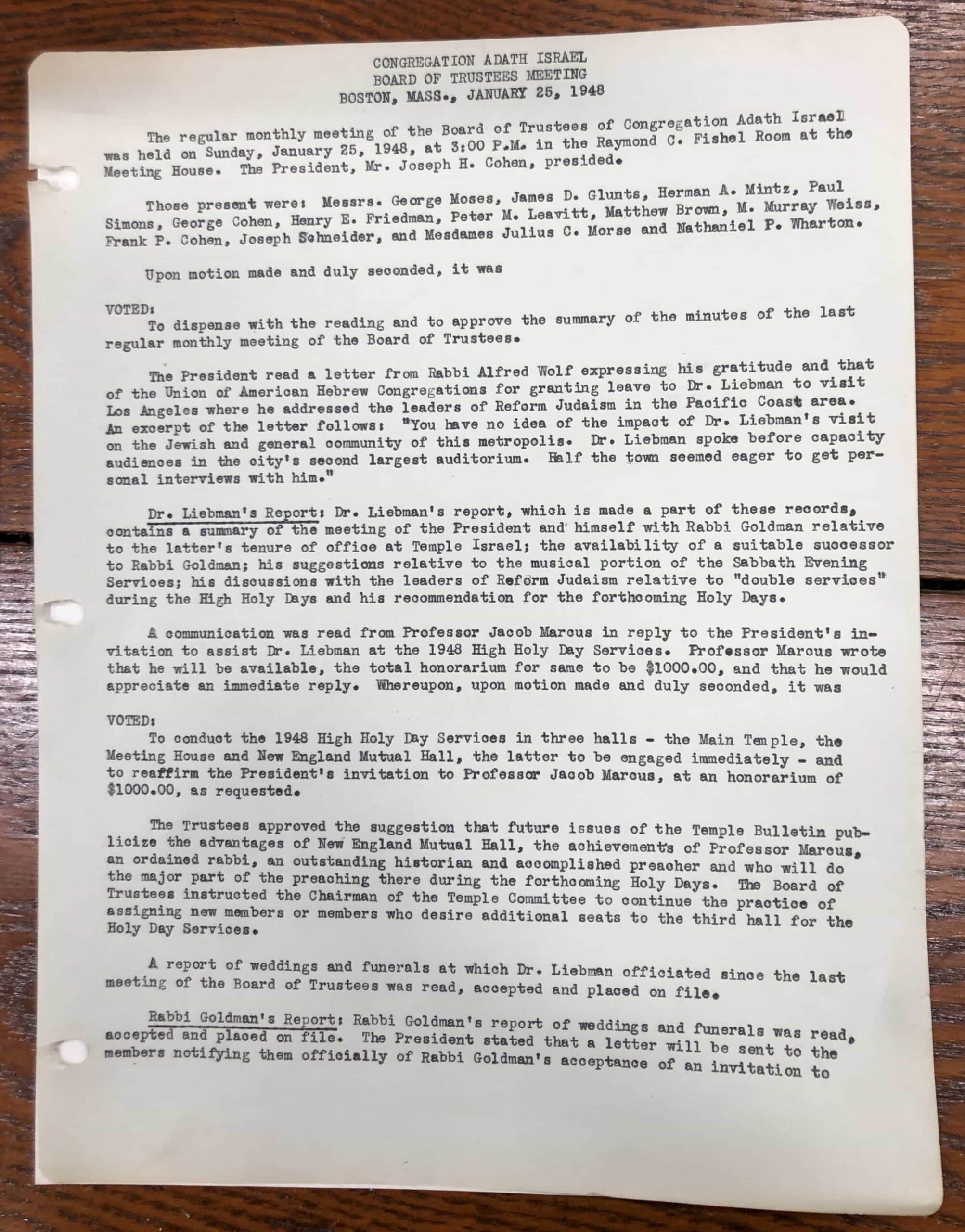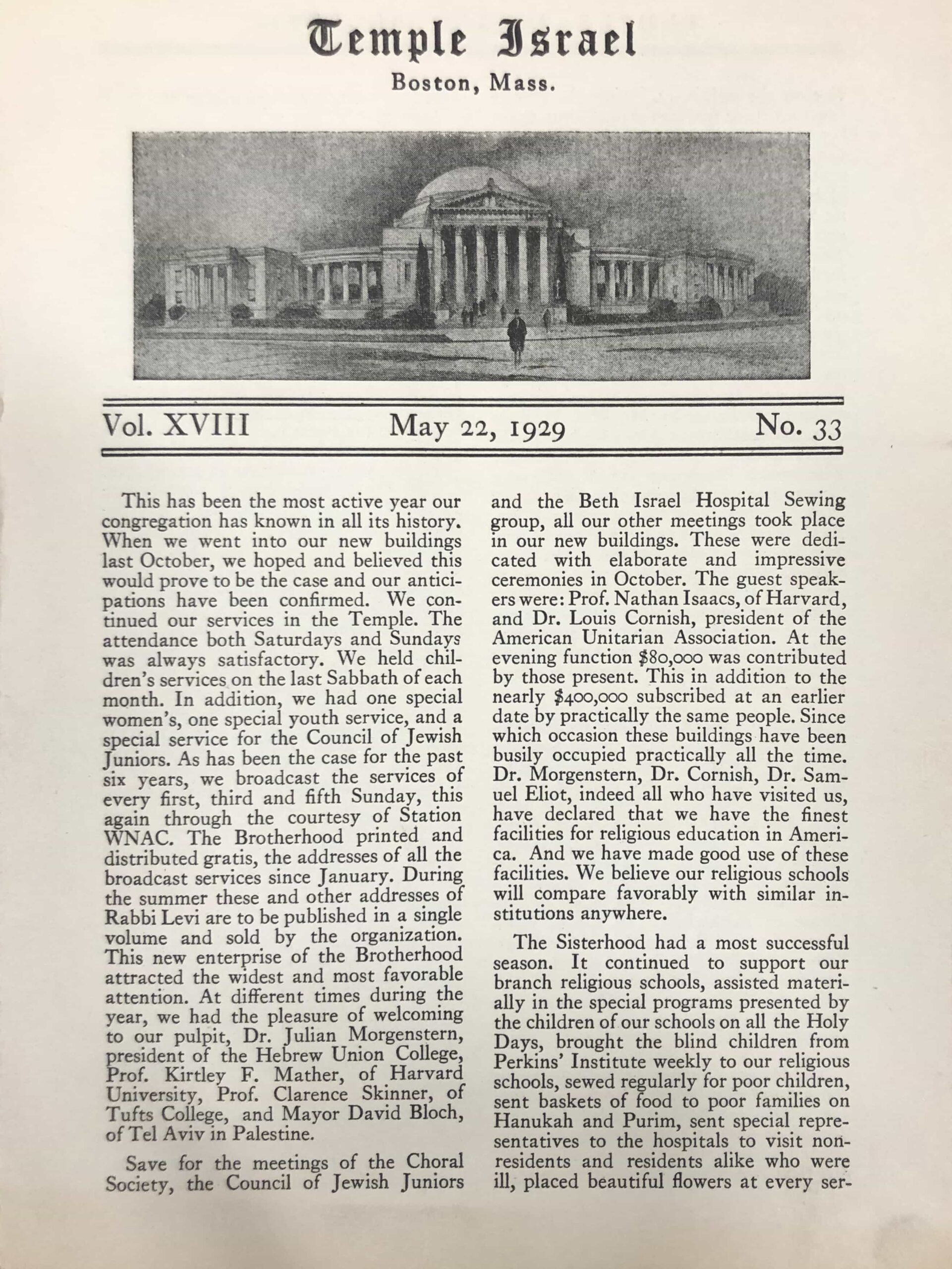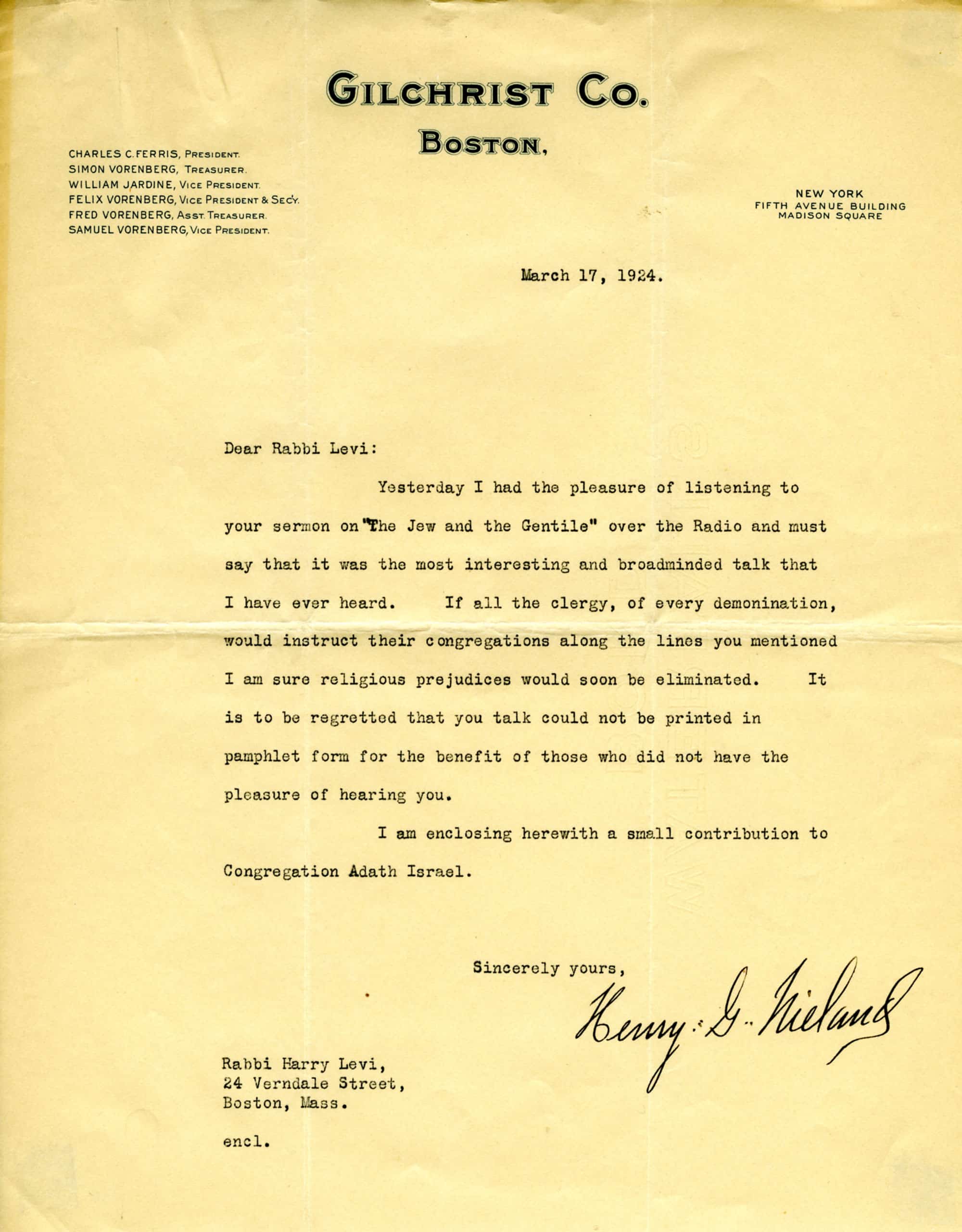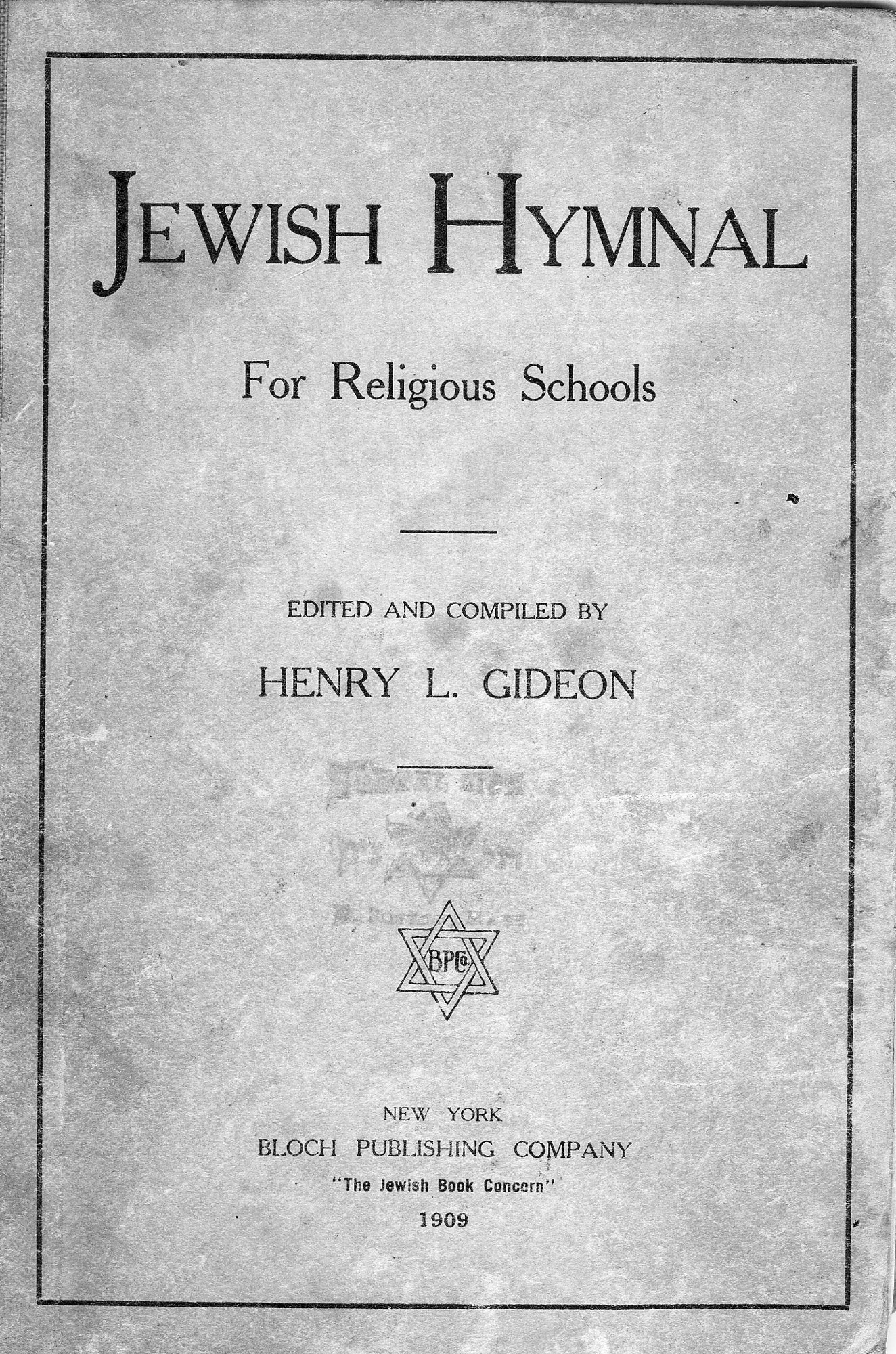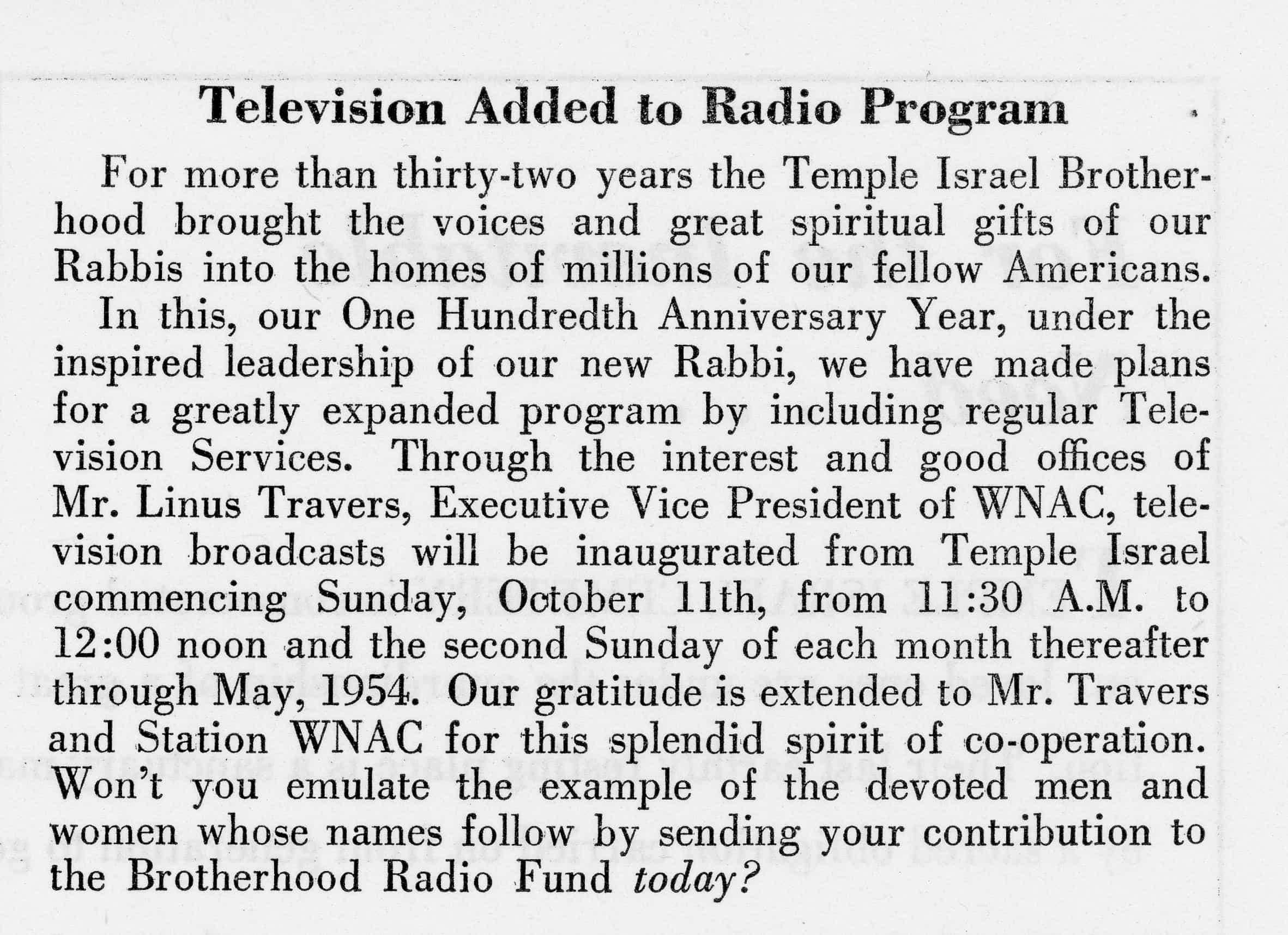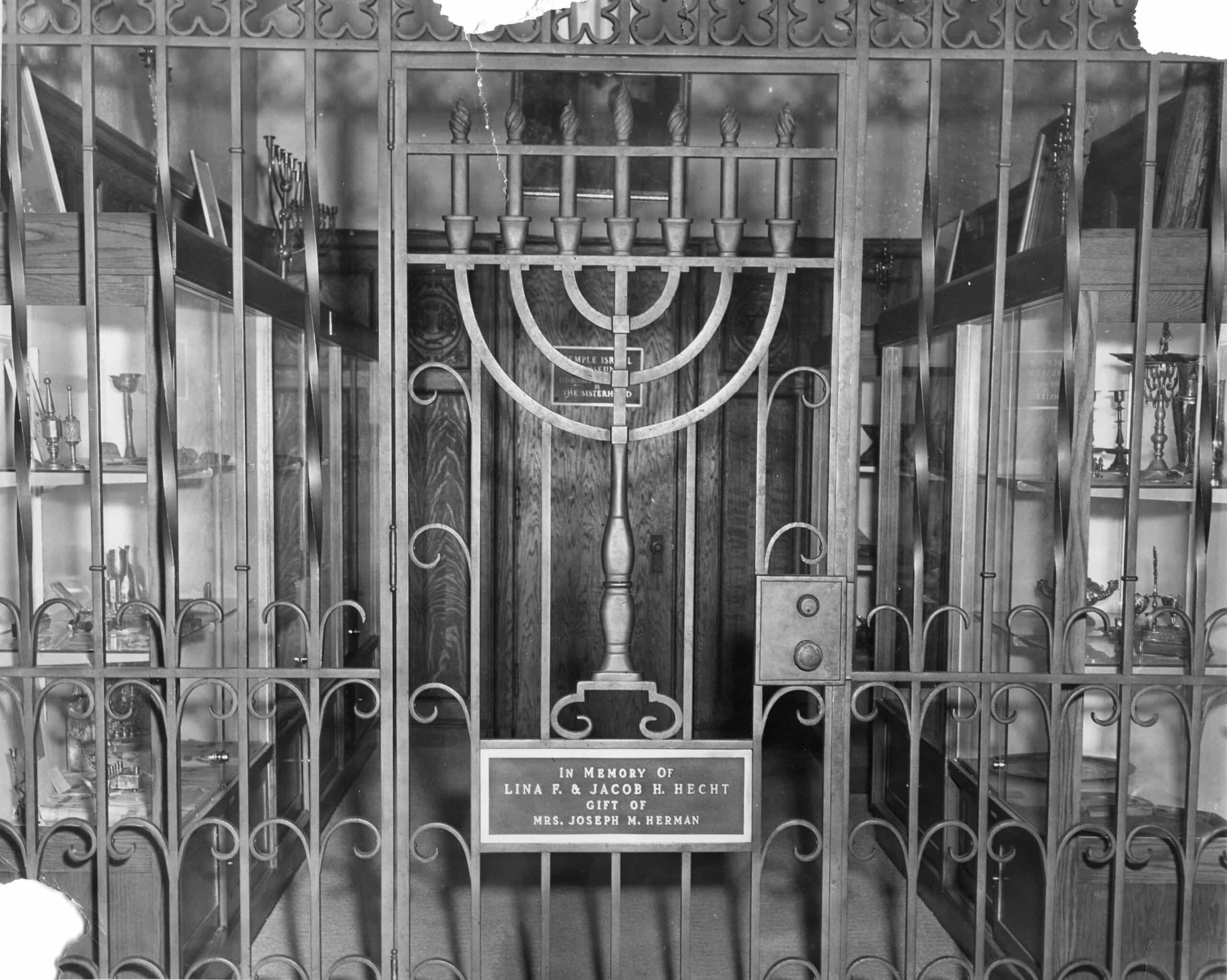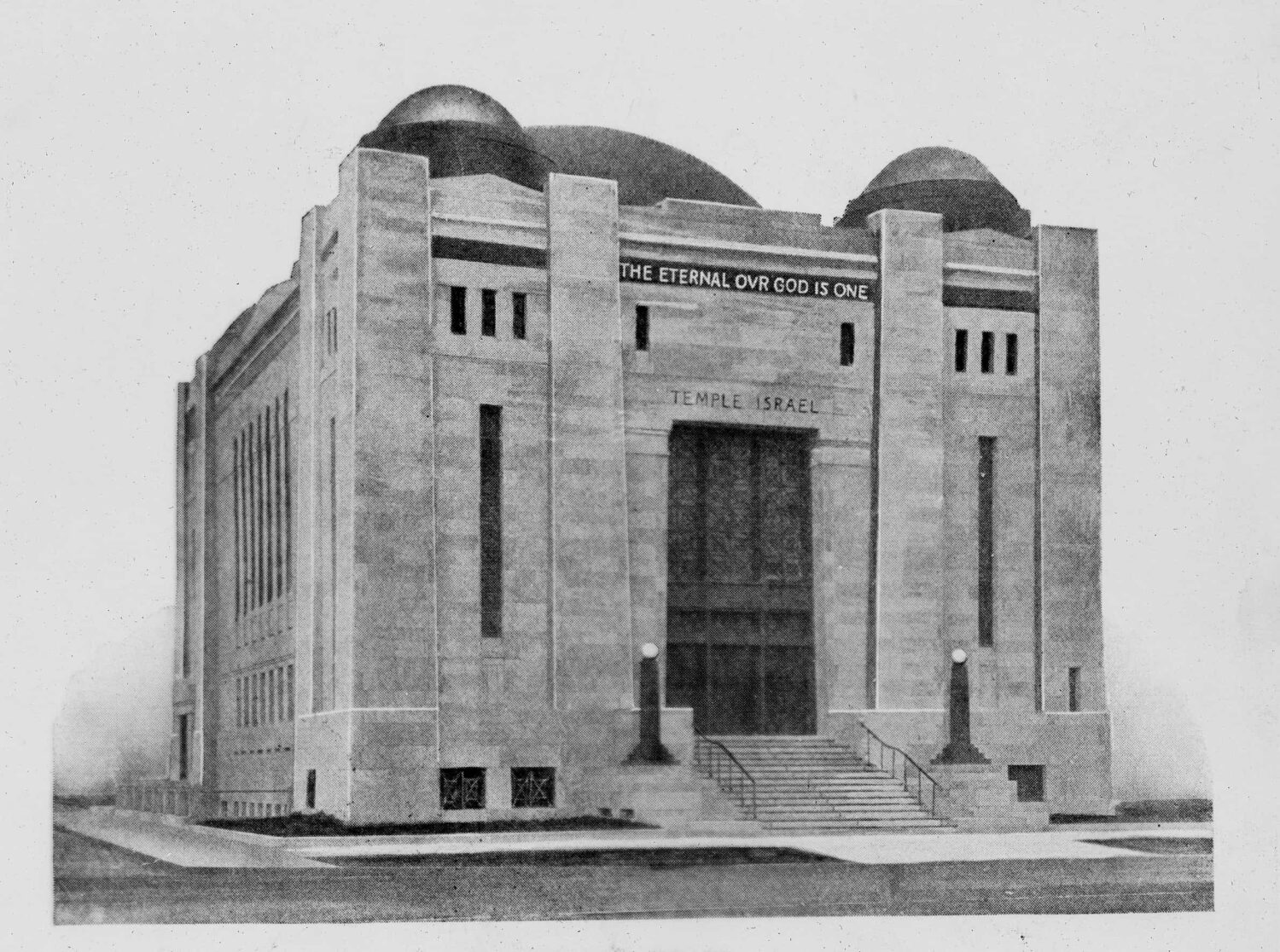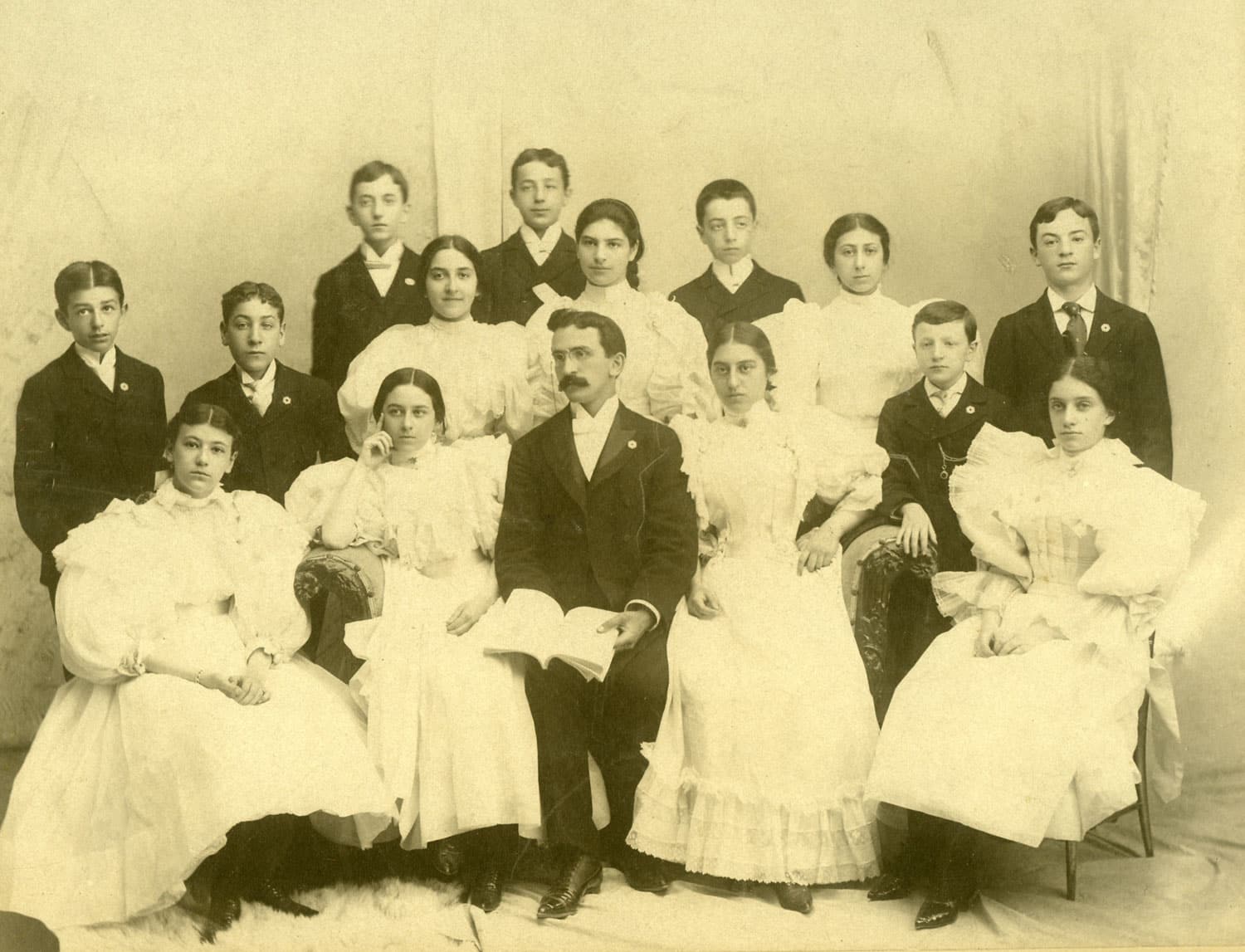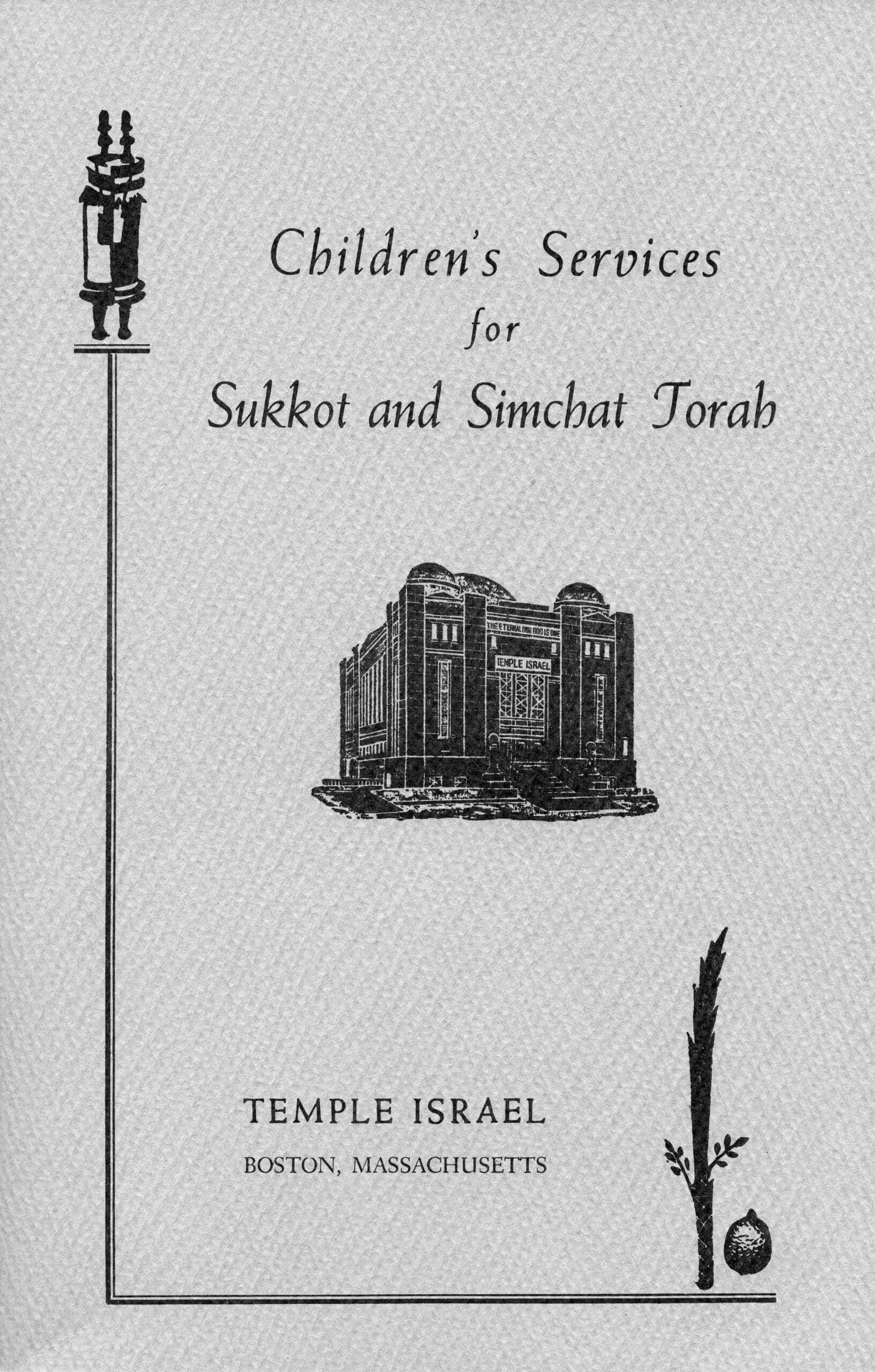Our History
Temple Israel of Boston is the second oldest congregation in the Boston area, and the largest Reform congregation in New England. The Wyner Archives of Temple Israel of Boston maintains and preserves the congregation’s historical records, including physical and electronic documents, publications, sound recordings, images, electronic records, and other items dating from Temple Israel’s founding in 1854 to the present. It serves as an important resource for staff, clergy, members, and a broad range of users, from people who want to learn more about their family history as well as researchers and scholars studying all aspects of Reform Jewish history, including synagogue life, Jewish practice, Boston’s Jewish community, the regional and national activities of our past clergy, and more.
Archival Collections: What We Collect
We have manuscripts and personal papers, correspondence, meeting minutes, bulletins, religious school yearbooks, photographs and digital images, audio and audiovisual recordings, scrapbooks, and memorabilia in our archives. In addition to institutional records produced by the administration, clergy, and staff, we have collections from the religious school, preschool, committees, synagogue members, lay leaders, the Riverway Project, the Frances Jacobson Early Childhood Center, and other auxiliary organizations.
We also collect the personal papers and memories of past and present temple members. If you would like to donate items that we collect or have memories that you would like to share, please email archives@tisrael.org.
Archival Collection List
Administrative Records
These records relate specifically to the administration of Temple Israel. They include but are not limited to correspondence, meeting minutes and reports, mailings and notices, brochures, finance reports, and supplemental photographic material. The collection includes:
- Minutes of the Board of Trustees, December 1861-present
- Annual and Special Congregational Meetings, 1942-present
- Membership Committee, 1861-present (with gaps)
- Temple Committee, 1944-1990
- Bylaws/Legal Committee, 1923-present
- Treasurer’s Reports, 1921-present
- Fundraising/Development records, 1925-present (with gaps)
- President and Executive Director papers, 1918-1994 (with gaps)
- Membership files (for inactive members only)
Anniversaries Collection
This collection contains material related to important temple anniversaries, including planning records, publicity, programs, photographs, and so forth.
Audio, Audio-Visual, and Visual Collection
This collection contains audio and video recordings of temple services, rabbinic sermons, special events, and other functions/activities related to the temple, as well as a large amount of physical and digital audio and visual material. Formats include: photographs, lantern slides, glass slides, magnetic tape recordings (cassette, VHS, reel to reel, etc.), vinyl records, and CDs/DVDs.
Biographical and Subject Files
The archives maintains informational files about the temple, American Judaism, Jewish Boston, and select congregants, staff, and clergy. The files include some correspondence, pamphlets, brochures, clippings, and other secondary sources.
Book Collection
This collection includes prayer books, books of sermons, books written by Temple Israel clergy and staff, and selected books written by temple members.
Buildings Collection
This collection contains records regarding the various buildings Temple Israel has owned and occupied over its 150-year-plus history. Material includes fundraising records, architectural and construction plans, deeds of ownership, maintenance records, and a significant collection of photographs for the following buildings:
- Pleasant Street (1854-1885) (no plans or images)
- Columbus Ave. (1885-1902)
- Commonwealth Ave. (1907-1968)
- Longwood Ave. (1928-present)
Cemetery Records
Temple Israel’s cemetery in Wakefield, Massachusetts, was founded in 1859. The archives contains a variety of records pertaining to this historic cemetery, including burial records, maps and plans, legal deeds, maintenance records, and photographs. It also contains the records of the temple’s cemetery committee and programs for the annual Memorial Day service.
Club and Committee Records
Temple Israel has always offered a variety of social and cultural activities and community service opportunities for its members, including, among others:
- Women of Reform Judaism (formerly Sisterhood), 1920s-present
- Brotherhood, 1949-1986
- Social Action Committee, 1959-present
- Israel Committee, 1959-1986
- Garden Club, 1940s-1990s
- Art Committee, 1900s-1980s
- Couples Club, 1958-1984
- College Club, 1959-1982
- Music Committee, 1920s-present
Educational Programs
Temple Israel’s educational programs for both children and adults have been a central focus throughout the synagogue’s history. Documentation is incomplete, but includes material concerning the religious school curriculum; consecration, bar/bat mitzvah, confirmation, and graduation services; youth programs and activities; the PTA; the education committee; and the nursery school. A large amount of material is also available regarding the temple’s continuing/lifelong education programs, lecture series, and library.
- Education committee, 1948-1963
- Frances Jacobson Early Childhood Center, 1989-present
- Religious School, 1870s-present (bulk 1950s-1980s)
- Parent/Teacher Association, 1950s-1980s
- Confirmation, 1950s-present
- Bar/Bat Mitzvah, 1950s-present
- Continuing Education Committee, 1920s-present
- Youth programs (youth committee, RYFTI, NEFTY, FASTY), 1930s-present
- Library and Library Committee, 1940-present
- Adult Education Committee, 1940-present
- Temple Israel Lifelong Learning Initiative (TILLI), 2009-present
- Samuel Nemzoff Papers, 1942-1974
Holidays and Festivals Collection
This collection contains material related to various holidays and festivals, including but not limited to Passover, Purim, and High Holidays. Material includes programs; prayer books; pamphlets, brochures, and other printed material; and photographs.
Life Cycle Records
These include records of births, baby naming, bar/bat mitzvah, marriages, and deaths, all generated by the rabbinic staff.
Oral History Collection
This collection includes audio recordings and some transcripts of oral history interviews with various temple clergy, staff, lay leaders, and congregants from the 1970s through the present day. It also includes material from the “Women Whose Lives Spanned the Century” oral history project.
Print Collection
The Archives contains a large collection of prints documenting congregational life at Temple Israel from the 1870s. Included are portraits of significant clergy, administrators, and congregants; photographs of special events and holidays in the temple and religious school; and prints of the temple’s various buildings.
Publications Collection
The Archives holds numerous publications produced by Temple Israel administrators, clubs and committees, the religious school, and congregants, including:
- Histories of Temple Israel and affiliated groups
- Temple Israel Bulletin, 1907-present
- “Friday Night Handouts,” 1981-present
- Religious service programs
- Torchbearer (religious school yearbook), 1947-1972
- Confirmation, Post-Confirmation, Hebrew School, and Graduation service programs, 1900-present
- Annual reports, catalogs, and promotional literature (pamphlets, brochures, programs)
Rabbinical Collections
The Archives contains records from many members of the clergy generated during their time at Temple Israel. The collection includes biographical sketches in the vertical files, miscellaneous documents, or published books. There are also photographs of rabbis in the portrait files. In certain cases, we hold more extensive material that documents some rabbis’ personal lives and professional careers outside of the temple. Here are some highlights for the senior rabbis:
Joseph Sachs (1854-1856): portraits; biographical file
Joseph Shoninger (1856-1874): portraits; biographical file
Solomon Schindler (1874-1894): portraits; photographs (including family album); some correspondence, sermons, and other documents; Messianic Expectations (1886); biographical file; (also see manuscript collection at American Jewish Archives, Cincinnati)
Charles Fleischer (1894-1911): portraits; correspondence; installation materials; biographical file
Harry Levi (1911-1939): portraits; audio recordings; correspondence; reports to board; sermons and speeches; life cycle records (marriages 1911-1913, deaths 1911-1913, confirmations 1912-1953); clippings, history of TI under his rabbinate, anniversary booklet, A Great Adventure and A Rabbi Speaks (books of sermons); obituary; prayer books; biographical file
Joshua Loth Liebman (1939-1948): portraits; audio recordings; correspondence; sermons; materials related to the book Peace of Mind (1946); memorial tributes; life cycle records (weddings and funerals); 1988 museum exhibit materials; biographical file; (larger manuscript collection at Boston University Archives)
Abraham J. Klausner (1949-1953): portraits; audio recordings; sermons; clippings; correspondence; reports to board; life cycle records; installation materials; biographical file
Roland B. Gittelsohn (1953-1977): portraits; photographs; audio recordings; sermons; memos and reports; life cycle records; biographical file; (also see manuscript collection at American Jewish Archives, Cincinnati)
Bernard H. Mehlman (1977-1999): portraits; photographs; audio and audio-visual recordings; correspondence; sermons; reports; life cycle records; biographical files; (also see manuscript collection at American Jewish Archives, Cincinnati)
Ronne Friedman (1999-2016): Portraits; photographs; audio and audio-visual recordings; correspondence; day files; life cycle records; education director materials; biographical file
Elaine S. Zecher (2016-): portraits; photographs; audio recordings; correspondence; sermons; reports; day files; life cycle records; biographical file
In addition, we have many materials for the following Assistant Rabbis and Cantors:
Assistant Rabbis:
- Samuel Wolk (1923-1929)
- Beryl D. Cohon (1930-1939)
- Leo A. Bergman (1940-1942)
- Albert A. Goldman (1946-1948)
- Irving A. Mandel (1948-1950)
- Earl A. Grollman (1950-1951)
- Maurice L. Zigm0nd (1951-1954)
- Leon A. Jick (1954-1957)
- Robert W. Shapiro (1957-1960
- Charles A. Kroloff (1960-1963)
- Harvey J. Fields (1963-1968)
- Frank M. Waldorf (1968-1971)
- Paul J. Menitoff (1970-1973)
- Paul J. Citrin (1947-1978)
- Jeffrey Perry-Marx (1983-1985)
- William L. Berkowitz (1985-1990)
- Ruth Alpers (1994-1999)
- Jonah D. Pesner (1999-2006)
- Jeremy Morrison (2001-2015)
- Stephanie D. Kolin (2006-2010)
- Matthew Soffer (2010-2019)
- Jen Gubitz (2016-2021)
Cantors:
- Herbert Fromm (1941-1972)
- Murray Simon (1972-1983)
- Roy Einhorn (1983-2020)
Research Your Family History
We have several kinds of records that might be useful for genealogists and others interested in their family history. Some membership and cemetery records go back to the nineteenth century, but most existing life cycle records date from the 1940s forward. Because most of these were kept by the clergy members who performed the ceremony (baby-naming, bar or bat mitzvah, marriage, funeral etc.), please include as much information as possible to help expedite your search when inquiring.
Family Research Request Form
Research Projects
Most of the material in the Wyner Archives documents the administrative history of Temple Israel, its affiliated clubs and committees, and the congregational life of members. Past researchers have used the archives for research on a variety of topics including changes in Jewish rituals and music, projects on past members of the clergy, synagogue architecture, Jewish education, art, music, interfaith relations, local history, and more.
Manuscripts, minutes, published and printed material, photographs, scrapbooks, audiovisual recordings, vertical files, memorabilia, and other material illustrate the ways Temple Israel has changed and grown, as well as the traditions it has maintained. While the earliest records date from the 1850s, most items are from 1900 to the present.
What You Need to Know About Using the Archives
Mission and Policies Overview
Mission Statement
Temple Israel is the second oldest congregation in the Boston area, and the largest Reform congregation in New England. Founded in 1854, Temple Israel has a long history that details the evolution of Boston’s Jewish community. The Temple Israel Archives serves as the repository for records, documents, publications, and images relating to the history and administration of Temple Adath Israel of Boston. These records document the history of the congregation and its members. Together they provide primary source materials that are useful to the clergy, staff, members of the synagogue, and other researchers. The Archives also serve as a resource for researchers interested in the history of Boston’s Jewish community and family research.
Collecting Policy
We actively collect institutional records from administrators and other staff, clergy, religious school, preschool, committees, synagogue members, lay leaders, the Riverway Project, the Frances Jacobson Early Childhood Center, and other auxiliaries. This includes the following: administrative records, manuscripts and papers, meeting minutes, bulletins, religious school yearbooks, photographs and digital images, audio and video recordings, scrapbooks, and memorabilia.
Donating Material to the Archives
The archives accepts any material that will make its collections useful for staff and researchers. We welcome material related to the temple’s various committees and clubs, the clergy, the religious school, and various events over the years. We are also interested in material concerning the lives of congregational members. Please contact the archivist for more information if you are interested in donating materials to the archives.
Collections Access and Handling Policy
Access to the Collections
The Temple Israel Archives is open to all members of the temple community, as well as the general public, and we actively encourage the use of our collections as a cultural and historical resource. Office hours are Monday through Friday by appointment only. Researchers are required to register before using the materials and to observe established policies and procedures that ensure the security and preservation of the collections (see the Collections Access and Handling Policy below). The archivist may also request a preliminary conversation prior to your visit to discuss your research topic so that relevant materials can be located and taken out. Finding aids and inventories are available for a small number of the collections. Copies may be requested by contacting the temple archivist.
Handling Policy
- All archival materials must be used in the archives.
- Researchers must fill out a research request form (below) and have it approved by the archivist prior to their visit. This form helps to track materials consulted in the course of your research. The forms also serve as a record of use for the archives.
- No food or drink is allowed near the materials.
- Researchers must use pencils to take notes—no other writing instruments are allowed. The archivist can provide you with a pencil and note paper if necessary. Cell phones and laptops are permitted in the archives.
- Please inform the archivist prior to your visit if you would like to photograph any items. The archivist will examine the materials to determine whether images are permitted.
- Finding aids and inventories exist only for a very limited number of collections. If one is available, please review it in advance of your visit to help you locate specific items. More effort will be required to locate relevant materials for less processed collections.
- Only one folder of material is allowed on the table at a time.
- Items should not be removed from folders. If you see something you would like to have copied, mark its location with a slip of acid-free paper (provided), and make a note of the item, folder name, box name and/or number, and collection in your own notes. If the item is photocopied, mark the same info on the back of the copy to ensure easy retrieval of the item(s) in the future.
- Many of the materials in the archives are very fragile. The archivist will decide if a particular item may be photocopied. If it cannot be photocopied, the archivist may be able to make other arrangements.
- Please be aware that all copies and photographs are for research purposes only. If you decide that you would like to use an image in a publication, you must make a separate request to use that image.
- Gloves (provided) must be worn at all times when looking at photographs to protect them from fingerprints.
- There are many unidentified photographs in the collection. If you are able to identify people, places, events, and/or occasions in an unlabeled image, we would be very grateful for your help. Please inform the archivist, who will provide you with paper flags that you can use to note the appropriate information.
Access Restrictions
The following items in the collections may have access restrictions:
- Material with sensitive personal and/or financial information (may be restricted or redacted at the archivist’s discretion).
- Materials in poor physical condition (may be restricted for their protection if necessary).
The following items in the collections are closed:
- Administrative records from the last 35 years that contain confidential information, especially those from the Board of Trustees.
- Membership records are closed to researchers who are not family members unless they have the written permission of the specific member or their families. For more information, contact the temple archivist.
Researcher Form
Researcher Request Form
Past Voices
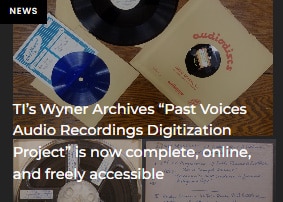 This newly digitized collection contains several hundred recordings dating from 1934 to 1979, a period when Reform Judaism was profoundly transformed by world events and changes in American society. Digitized from fragile tapes and records, they include worship services with sermons, radio and television programs (audio only), lectures, and other special programs and community events that provide a unique window into congregational life.
This newly digitized collection contains several hundred recordings dating from 1934 to 1979, a period when Reform Judaism was profoundly transformed by world events and changes in American society. Digitized from fragile tapes and records, they include worship services with sermons, radio and television programs (audio only), lectures, and other special programs and community events that provide a unique window into congregational life.
While most of the recordings date from the 1940s and 1950s and feature prominent Temple Israel Rabbis Joshua Loth Liebman (1939-1948), and Roland B. Gittelsohn (1953-1977), the speakers also include many other members of the clergy, congregants, and other Jewish and non-Jewish religious leaders. The recordings reveal Jewish perspectives on important contemporary events and issues over time such as Zionism, Antisemitism, World War II and post-war America, the Holocaust, the Nuclear Age, McCarthyism, civil rights, and conformity, but also universal themes such as marriage, parenting, work, mental health, intermarriage, prejudice, racism, and more. Together, they capture the social and cultural milieu of the times and the tone and rhythms of synagogue ritual and Jewish Reform religious practice over the mid-twentieth century period.
You can listen to the Past Voices recordings via free streaming access at Digital Commonwealth, Massachusetts Collections Online or at the Digital Library of America (DPLA).
You can request access to individual recordings by contacting the Archives. You can refer to the complete list of recordings for more information.
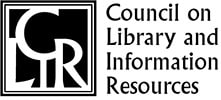 This project was supported by a Recordings at Risk grant from the Council on Library and Information Resources (CLIR). The grant program is made possible by funding from The Andrew W. Mellon Foundation.
This project was supported by a Recordings at Risk grant from the Council on Library and Information Resources (CLIR). The grant program is made possible by funding from The Andrew W. Mellon Foundation.
Audio Recordings
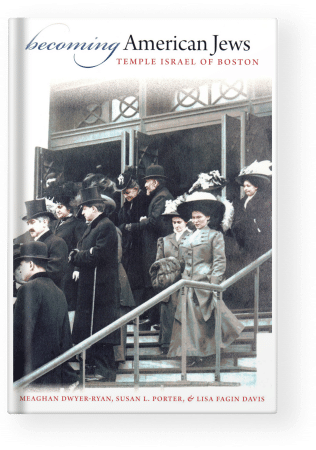
Want to learn more?
Becoming American Jews: Temple Israel of Boston, Brandeis University Press, 2009 Tagline: “An important contribution to the historical record of the development of American Jewish life.” Review, Journal of Urban History, 2015
Becoming American Jews: Temple Israel of Boston
Temple Israel of Boston has long occupied an important position in the region and in American Jewish life. The illustrated book, Becoming American Jews: Temple Israel of Boston, uses archival documents, demographic data, and oral histories to explain how Temple Israel of Boston, founded in 1854, became the first Reform synagogue in New England and how the congregation continually adapted to changes in American society by balancing members’ desires for innovation with tradition and acculturation with distinctiveness. It brings to life both the stories of the men, women, and children who built and maintained this vital institution and the larger story of the transformations in religious worship practices, education, and social justice that define American Reform Judaism today.
How to Get the Book:
You can order Becoming American Jews directly from Temple Israel. It can also be purchased from Brandeis University Press and other online booksellers.
Beyond the Wyner Archives
Interested in knowing where you might find more information about Temple Israel, its clergy and members, or other aspects of the Boston Jewish community? Here’s a short list to get you started:
List of Research Resources
Academic Guide to Jewish History
Jewish archival materials from around the world
American Jewish Archives
Rabbi Roland B. Gittelsohn papers, Conversion certificates and much more
Boston Public Library, Main Branch and Research Library
Genealogical material, city directories, newspapers, maps and much more
Boston University Special Collections
Rabbi Joshua Loth Liebman Papers and much more
JewishGen
the Global Home for Jewish Genealogy
Jewish Women’s Archive
Much material, including oral histories, about present and past Jewish women, including some Temple Israel members, and much more
Massachusetts State Archives
Older marriage, and death records, census records, town histories and much more
National Archives and Record Administration, Boston Federal Records Center
Birth, marriage, and records, census records, immigration and naturalization records
Temple Ohabei Shalom
Predecessor of Temple Israel of Boston
The Wyner Family Jewish Heritage Center at New England Historic Genealogical Society
Boston Jewish community and institutional records, genealogical materials, census records, birth, marriage, and death records, immigration and naturalization indexes and much more
Newspapers:
Articles and obituaries; available online and on microfilm at the Boston Public Library and other libraries
- Jewish Newspapers: [Boston] Jewish Advocate, 1905-present
- Other Newspapers: The Boston Globe [digitized from 1874]; Boston Herald; Boston Traveler; Boston Post; New York Times
For more resources, see the bibliography to Meaghan Dwyer-Ryan, Susan L. Porter, and Lisa Fagin Davis, Becoming American Jews: Temple Israel of Boston (Brandeis University Press, 2009).
Contact Us
 617-566-3960
617-566-3960
 archives@tisrael.org
archives@tisrael.org

